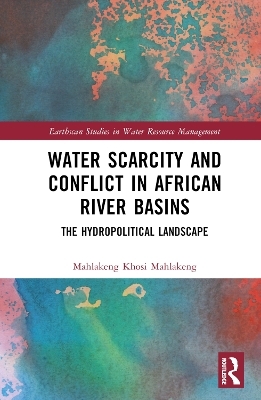
Water Scarcity and Conflict in African River Basins
The Hydropolitical Landscape
Seiten
2023
Routledge (Verlag)
978-1-032-43243-4 (ISBN)
Routledge (Verlag)
978-1-032-43243-4 (ISBN)
The book presents a critical and comparative analysis of the hydropolitical landscape of African transboundary river basins which, for much of the past century, have been affected by water scarcity.
River and lake basins can become a source of tension and conflict due to a complicated mix of environmental, demographic, diplomatic, historical and geopolitical factors. This book, however, specifically focuses on the important, and often under looked, role played by scarcity in generating or exacerbating conflicts in shared river basins. Asserting that transboundary river basins tie states into a web of interdependence, this book raises awareness of how water scarcity, or the depletion of water resources, complicates this relationship as nations are forced to look beyond their own borders to meet the demand for water to satisfy multiple needs. Taking a comparative approach, it examines three shared basins: the Orange-Senqu, the Nile and the Niger River basins. While situated in different regions, all three basins are marked by serious environmental challenges that are detrimental to combustible hydropolitics over such shared water resources and they provide fascinating insights into the links between climate variability and change, water resources, human security, conflict, adaptation and regime capacity. Overall, this book argues that conflict over transboundary resources can be prevented given the establishment of norms, rules, and the role of external actors that help regulate state behaviour and control their impacts.
This book will be of great interest to students and scholars of water resource management, hydropolitics, environmental conflict, resource scarcity and international relations. It will also be of interest to policymakers involved in transboundary water resource governance.
River and lake basins can become a source of tension and conflict due to a complicated mix of environmental, demographic, diplomatic, historical and geopolitical factors. This book, however, specifically focuses on the important, and often under looked, role played by scarcity in generating or exacerbating conflicts in shared river basins. Asserting that transboundary river basins tie states into a web of interdependence, this book raises awareness of how water scarcity, or the depletion of water resources, complicates this relationship as nations are forced to look beyond their own borders to meet the demand for water to satisfy multiple needs. Taking a comparative approach, it examines three shared basins: the Orange-Senqu, the Nile and the Niger River basins. While situated in different regions, all three basins are marked by serious environmental challenges that are detrimental to combustible hydropolitics over such shared water resources and they provide fascinating insights into the links between climate variability and change, water resources, human security, conflict, adaptation and regime capacity. Overall, this book argues that conflict over transboundary resources can be prevented given the establishment of norms, rules, and the role of external actors that help regulate state behaviour and control their impacts.
This book will be of great interest to students and scholars of water resource management, hydropolitics, environmental conflict, resource scarcity and international relations. It will also be of interest to policymakers involved in transboundary water resource governance.
Mahlakeng Khosi Mahlakeng is a Lecturer in the Department of Political and Administrative Studies at the National University of Lesotho, and a Research Fellow at the University of the Free State in the Department of Political Studies and Governance. He holds a PhD in in Political Science from the University of the Free State, South Africa.
1: Scarcity and Conflict 2: Homer-Dixon’s environmental scarcity theory and regime theory 3: The Orange-Senqu River Basin 4: The Nile River Basin 5: The River Niger Basin 6: Findings and Concluding remarks
| Erscheinungsdatum | 15.03.2023 |
|---|---|
| Reihe/Serie | Earthscan Studies in Water Resource Management |
| Zusatzinfo | 2 Tables, black and white; 2 Line drawings, black and white; 7 Halftones, black and white; 9 Illustrations, black and white |
| Verlagsort | London |
| Sprache | englisch |
| Maße | 156 x 234 mm |
| Gewicht | 660 g |
| Themenwelt | Naturwissenschaften ► Biologie ► Ökologie / Naturschutz |
| Naturwissenschaften ► Geowissenschaften ► Geografie / Kartografie | |
| Naturwissenschaften ► Geowissenschaften ► Hydrologie / Ozeanografie | |
| Sozialwissenschaften ► Politik / Verwaltung ► Vergleichende Politikwissenschaften | |
| Sozialwissenschaften ► Soziologie ► Spezielle Soziologien | |
| ISBN-10 | 1-032-43243-8 / 1032432438 |
| ISBN-13 | 978-1-032-43243-4 / 9781032432434 |
| Zustand | Neuware |
| Haben Sie eine Frage zum Produkt? |
Mehr entdecken
aus dem Bereich
aus dem Bereich


